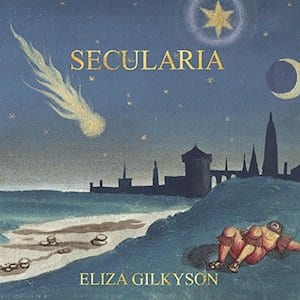 Eliza Gilkyson – Secularia
Eliza Gilkyson – Secularia
Red House Records – 13 July 2018
Four years on from the Grammy-nominated The Nocturne Diaries, Eliza Gilkyson returns with her 20th album, one in which its predecessor’s spiritual notes sound even clearer, the singer describing how she and her producer son used sonic space to make the songs “almost like meditations.”
Gestating over several years, it was inspired by both the early feminists and the current #metoo movement in questioning the patriarchal notion of God as Man and its centuries-long impact on the lives of women. She says the songs were “inspired by a new way of understanding myself as a woman in the context of a culture going through a massive overhaul.”
Gilkyson’s son isn’t the only family input, the album opening with Solitary Singer with lyrics by her poet grandmother, Phoebe Hunt Gilkyson and music by father Terry. The song dates back to the 40s when it was the title song to a weekly Armed Forces Network radio show and, adorned by Warren Hood’s fiddle and Kym Warner’s mandolin, concerns the harmony of the natural world and the interrelationship with humanity and nature as she softly sings in “Dark comes like a bird in flight/Most good people have gone to rest/But us poor folk who wake at night/When we’re lonely we sing our best.” Her grandmother’s words regarding same connection are also adapted the catchy strum of Conservation where, joined in the chorus by Shawn Colvin and Cisco Ryder, the lyrics reject the idea of god, king, savior or a life beyond this world, the song essentially instructions for her funeral, to be returned to the earth and feed into the cycle of life.
Sandwiched between is the shimmering, pedal-steel laden Lifelines, its opening lines about how the centre cannot hold, pointedly borrowed from another poet, W.B.Yeats’ The Second Coming. That addressed the social, political and spiritual confusion in the world following WWI, but Gilkyson’s song strikes a more positive note in celebrating the coming together of like-minded people in the wake of the Trump election as “lifelines glow in the dark.”
Yeats’ influence can also be heard in the blues-tinged In The Name of the Lord, the most musically muscular track, a ringing electric guitar underpinning another song about chaos, of nature and a world spiralling out of man’s control in the name of religion. The pace, but not the tone shifts on the slow waltzer strum Dreamtime. An apocalyptic number about the price we pay for “taking all and wanting more”, its unfolds imagery of the air quivering with the promise of death and rain, “the hour far too late to plan or get to choose between love’s mercy and our fate”, Gilkyson just praying “to be some kind of guiding light when we cross over.”
Co-penned with former Spirit bassist Mark Andes, sparsely arranged for keyboards and acoustic guitar, a song of gratitude for nature’s bounty and the hearts that won’t give up, “all the sorrows that made me and the beauty that saved me”, Seculare offers a welcome positive note. Similar hymnal notes are struck on the orchestrally arranged piano ballad Reunion, a new beginnings song about the need to reconnect and move forward rather than just drift and try and return to what was left behind, and Sanctuary, the lyric a humanist rework of Psalm 23, on which she duets with gospel singer Sam Butler in celebration of inner spirit and the saving power of love rather than God.
The album’s strongest Americana notes are struck on the fiddle-led jauntily shuffling and lyrically upbeat consciousness awakening Through The Looking Glass and “beauty that comes like a pot of gold.” It’s followed by the steady slow march, passionately sung swelling six-minute epic of Emmanuelle, the title a gender spin on the name of the divinity, that, first written back in 1994, tells the anthemic story of herself and every woman and the journey back to self and the world “out of this darkened place”, Gilkyson joined on the choruses by Cisco Ryder, Delia Castillo, Adrienne Pedrotti, Chris Gage and Michael Hearne.
The search for a new spirituality beyond traditional religious structures informs her fiddle-coloured reading of the traditional gospel hymn Down By The Riverside, a number that features the late Jimmy LaFave who, dying at the time of the recording, poignantly takes lead on the third verse, and, in the album context, shines a light on its social and political truths.
Drawing on A prayer of St. Francis of Assisi, the album ends with the simple piano and acoustic guitar Instrument, a shortcomings confessional (“your fractured vessel I’ve become”) and a call to whatever god, deity or universal power to “blow your horn magnificent/through the hollows of my bones”, a humanist rapture in a world fallen from grace and in need of redemption.
As an instrument sounding a clarion call for self-awareness and awakening in a divisive world, Gilkyson is finely tuned and Secularia a career-defining musical apotheosis. Praise be.
